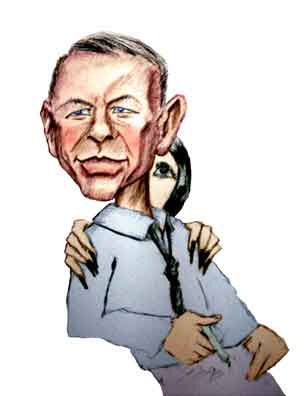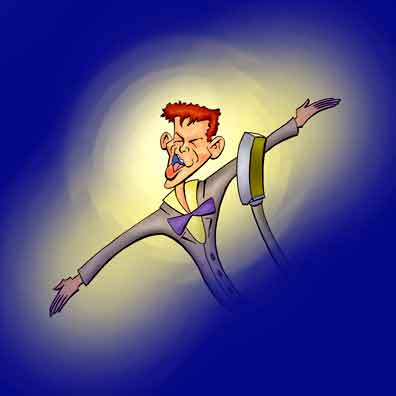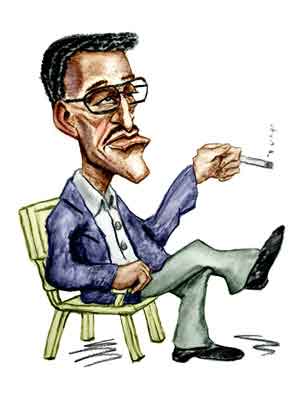Frank Sinatra
The Chairman of the Board

Frank Sinatra
The Chairman of the Board
Frank made it big singing for the swing bands in the late 1930's early 40's (first with Harry James and then with Tommy Dorsey). Later during World War II, The Voice struck out on his own and was probably responsible as much as anyone for the rise of the singer to the detriment of the instrumentalist in popular music.
When it looked like his recording career was slowing down, Frank began starring in Hollywood films and most weren't all that bad. Unlike other singers, Frank preferred to avoid musicals where the characters break into spontaneous song while walking down the street. Instead, when acting, he was an actor.
But what was really a surprise was that Frank was at his best in dramatic roles, one of which, his supporting role in From Here to Eternity, actually garnered him an Oscar. Among his other top ranked performances were as the nutty paranoid army officer in The Manchurian Candidate, as a heroin addict in The Man With the Golden Arm and as the able and heroic martinet, Colonel Joseph Ryan in Von Ryan's Express. Despite the near universal praise for Frank's latter performance, fans of the book will gag at the changes made by the scriptwriters.
But there's plenty of Frank for those liking lighter fare.
No one can forget Robin and the Seven Hoods, 4 for Texas, and of course Ocean's Eleven (far superior to the recent remake). Midway between drama and comedy was Frank's movie Tony Rome. Although at first glance it's just another Sam Spade type pot boiler, Frank does a nice job. Particularly refreshing is he plays a private investigator in probably one of the most realistic PI roles in a film. Instead of investigating a murder, a kidnapping, or going up against organized crime (all of which would get a real PI's license yanked before you could say "Gumshoe!"), Frank is hired by a rich fat-cat to bring his drunken daughter back home from a hotel room and then to find a diamond pin she lost while she was under the sauce.

Frankie!!!!!!
But it was as a singer and entertainer that Frank will be most remembered, and he ended up as one of the top paid entertainers of his time. He was still putting out #1 songs on the Top Forty when the bobby soxers who had sent him to the top were long gone. If you can find a record store still open somewhere, you'll probably find one of the largest bins holds the CD's of Old Blue Eyes.
We don't suppose we can talk about Frank without discussing his alleged ties with the mob. Everyone has seen the famous photo of Frank standing with arms around the shoulders of Gregory DePalma and Frank "Fatso" Marson. Also in the picture are Paul Castellano, Jimmy "The Weasel" Frattiano, Richard "Nerves" Fusco, and - yes - the god-fatherest of all the godfathers, Carlo Gambino.
You hear everything from Frank owing his success to mobster mentors making to the various movie producers and band leaders the proverbial offer they couldn't refuse to that his connections were nothing more than the mobsters attending his shows and later asking to meet the star (which is what Frank said). He met them, he said, shook their hands, and posed for photos just as he did with any other fans, he said.
But Frank's connections - even if innocent - were potentially hazardous to his show-business success. In 1950, Frank was summoned to testify before the famous Semate Kefauver Commission investigating organized crime. Originally learning he was being scheduled for public testimony, Frank and his lawyers, fearing the then young (35 years old) Frank appearing on camera would immediately tank his career (although reports are Frank used a more vigorous word), convinced the senators to agree to private testimony. Frank stated yes, he met the men at places where he was appearing. But again he insisted this was simply him greeting his fans as any entertainer would do.
This was the prevailing pattern. You can find Frank and various mobsters in pictures together. But when he sat down and was placed under oath, Frank - like when he was applying for a casino license to become part owner of The Sands Hotel in Las Vegas - made unequivocal statements that he had no business dealings or actions with the mobsters. If there were any provable connections Frank would not get his license but would also be subject to a perjury rap. One thing Frank wasn't was a fool.
Mob connections of the great and near great are often not proven in any real sense. Instead they are inferred from a series of associations that in some way link Person A with Mobster Z. And although to link A to Z, you have to go through a myriad of other connections from Person/Mobster B to Mobster/Person Y, somehow the implication is that A not only was a close partner of Z but was involved in Z's more nefarious businesses.
Such reasoning is fallacious not only in a strictly logical sense and in a probabilistic one. A implying B and B implying C may apply in classical propositional logic, but not in general relationships. If Aunt Rose knows Cousin Vinny and Cousin Vinny knows Grandfather Carlo, that doesn't mean that Aunt Rose knows Grandfather Carlo. And the more you look for connections, the more likely is you'll find them. So what may seem to be a real connection can be simply be the far end of a probability curve.
This doesn't mean that if you think you see a connection by following associations, there is never a real link. But you then have to find - not just more connections - but real documentation of the link. Lack of documentation is the issue in - quote - "proving" - unquote - that Frank was - quote - "connected with the mob" - unquote.
First let's get it straight. Even as late as the 1980's, many night club entertainers that had to - quote - "work for the mob" - unquote. That's because until corporations moved in, night clubs were largely privately owned businesses and many were indeed run by people with mob connections.
During an interview comedian Jay Leno gave a humorous - but straightforward - account of performing in a New York nightclub that had the proverbial Mafia connection. Riding in the car with the club owners, Jay jokingly whispered to his wife that he didn't have a gun.
Overhearing Jay's remarks, the man sitting in the front seat then turned around and handed Jay a pistol. Take it, the man said, there was no serial number, and when he was finished he could just throw it in a trash somewhere. Jay tried to politely refuse but the man was insistent. So there was Jay in New York carrying a loaded gun. His generous benefactor was none other than Jimmy "The Weasel" Fratianno.
But for all his appearances - on film, television, or in live concerts - one was not what you'd expect from a hip sophisticate like Frank Sinatra. And regardless of what you hear of Frank's possible seamier connections and cantankerous nature, you can't but help like him for it.
In the 1960's, Frank, along with Sammy Davis, Jr., and Trini Lopez appeared on the kids' show hosted by Soupy Sales. Soupy's program was presented on multiple levels. Older kids and even adults liked the show, not the least reason being that he had non-kid celebrities as guests. And this was long before it became standard fare on Sesame Street.
In this episode, Soupy was the maitre-d' of the Chez Bippy Restaurant and Frank, Sammy, and Trini came in. After some self-satirizing repartee between Soupy and Frank, Frank complained to Sammy that he had been picking on him all the way down there. He said in a sneak preview of Von Ryan's Express (largely regarded as one of Frank's better movies) the audience cheered and whistled and hollered.
"What happened?" asked Sammy, "Did the reel break?"
"No, the reel didn't break," retorted Frank. "Because I saved two girls in the picture."
"Yeah." Sammy turned to Trini. "One for the producer and one for himself."
"Is there any soup on the menu?" asked Trini.
"Yeah," replied Soupy, "but we wiped it off."
Soupy brought Sammy some frogs' legs.
"Hold it," said Sammy, "one of the these frogs' legs are shorter than the other."
"What do you want, buddy?" asked Soupy. "You want to eat it or dance with it?"

Sammy Davis, Jr
He appeared with Frank.
But for those who remember Soupy's show, you can guess the final outcome. Yes, by the time the skit was over, The Chairman of the Board ended up with a pie in his face.
So why would Frank, Sammy, and Trini appear in such a slapstick skit, for which in all probability they did for minimal scale or more likely for free? They were, Soupy said, just nice people.
References
Frank: The Voice, James Kaplan, Random House, 2015
Sinatra: The Chairman, James Kaplan, Random House, 2010
"Sinatra and the Mob: Just What Was Frank Sinatra's Association With 'Made Men'?", Yo Zushi, The New Statesman, December 5, 2015.
"Why Frank Sinatra still matters", Geoff Edgers, The Washington Post, May 29, 2015.
"Interview with Jay Leno", That New News, Joe Rogan.
"Roger Moore Claims That Frank Sinatra's Mafia Ties Were Exaggerated", Ella Alexander, The Independent, September 16, 2014
"Coincidences and the Meaning of Life", Julie Beck, February 23, 2015, The Atlantic.
"Is Frank Sinatra Finished?", Barry Ulanov, Modern Television and Radio, December, 1948.